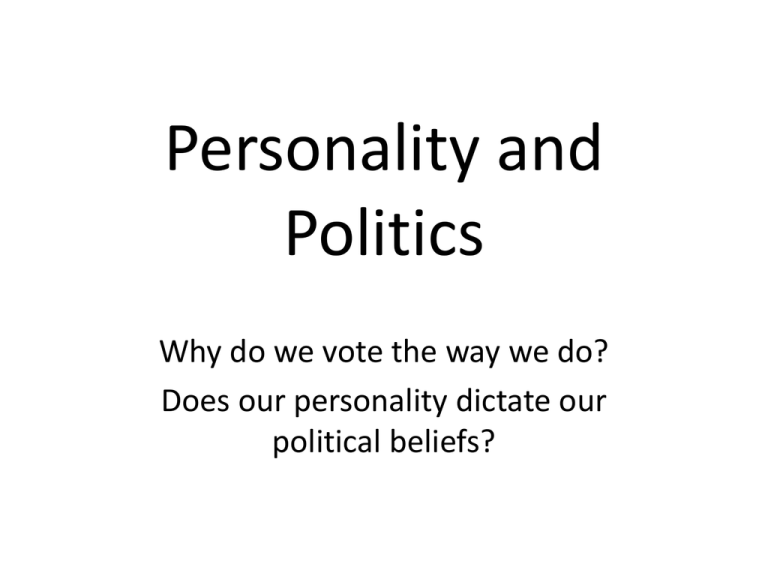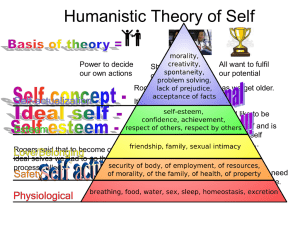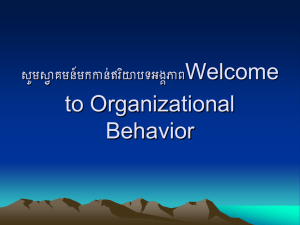
Personality and
Politics
Why do we vote the way we do?
Does our personality dictate our
political beliefs?
Compassionate Liberals and Polite
Conservatives: Associations of
Agreeableness with Political Ideology
and Moral Values
Jacob B. Hirsh, Colin G. DeYoung, Xiaowen Xu and
Jordan B. Peterson
(2010)
Past Research
• Political beliefs are derived from deeper psychological needs
which suggests that individuals may be predisposed by their
personality to adopt particular ideological perspectives.
• The adoption of political beliefs satisfies a variety of
motivational needs.
• For instance: Political conservatism is a belief system
characterized by resistance to change and the acceptance of
inequality , which are strategies that serve as defenses against
the experience of threat and uncertainty (Jost et al., 2007)
Could political attitudes be related to
personality traits?
• Findings that political attitudes are heritable and
thus genetically influenced (Bouchard et al., 2003; Koenig
& Bouchard, 2006) highlight the possibility of a
connection to basic traits.
• Conservatives: Higher on Conscientiousness
• Liberals: Higher on Openness (Intellect)
(Carney, Jost, Gosling, & Potter, 2008; Goldberg & Rosolack,
1994; Jost,2006).
What about Agreeableness?
• Authors suggest that Agreeableness is not usually mentioned
as a factor influencing political beliefs because it can be
divided into 2 opposite aspects: Compassion and politeness
• Authors suggest that compassion is associated to liberalism
while politeness is associated with conservatism
• This is based on the common conception that liberals are
more interested in equality and justice while conservatives
are more interested in order, tradition and stability (Hirsh et al.,
2010)
Studies
2 studies aiming at deciphering possible reasons for the lack
of association between Agreeableness and political affiliation
Study 1.
Aim: to determine whether the two aspects of Agreeableness
(compassion and politeness) correlate with different political
values.
Hypothesis:
• Politeness correlates with politically conservative values
• Compassion correlates with politically liberal values.
METHOD
481 participants between the ages of 20-83 years (97%
white).
Members of the Eugene-Springfield Community Sample
(ESCS), which is a longitudinal data collection project, since
1994.
ESCS members voluntarily take questionnaire that they
receive through the mail in exchange for money.
MEASURES
•
Big Five Aspect Scale (BFAS): derived by DeYoung et al. in 2007 for measuring the
broad big 5 dimensions of personality as well as the lower levels :
Agreeableness: Compassion and Politeness
Extraversion: Assertiveness and Enthusiasm
Conscientiousness : Industriousness and orderliness
Neuroticism: Volatility and Withdrawal
Openness: Openness and Intellect
Consists of 100 descriptions. Participants must rate their level of agreement on a 5
point lykert scale.
•
BFI: Big Five Inventory (Self and Peer reports), together with a political party
preference questionnaire given to the ESCS members in 2001
•
IPIP: 10 item scale assessing liberal vs. Conservative values on a 5 point lykert scale
given to ESCS members between 1994 and 1996.
RESULTS
•
Significant results were observed for Conscientiousness, Agreeableness and
Openness.
•
Politically republican attitudes correlate positively with conscientiousness and
correlate negatively with Agreeableness and Openness.
•
The significant results of Conscientiousness are driven by Orderliness but not
by Industriousness.
•
The significant results of Openness are driven by Openness but not by
Intellect.
•
Republican scores correlate positively with politeness and negatively with
compassion while liberal score correlate positively with compassion and
negatively with politeness.
AUTHORS’ COMMENTS
•
Past research has failed to acknowledge the association between
Agreeableness and political affiliation because of the instruments and analysis
employed.
•
This study used a variety of Big Five instruments which made it possible to
compare their ability to predict political outcomes in a set of post hoc
analyses.
•
The sub divisions of Agreeableness are suppressed when measuring for all 5
factors simultaneously. These only emerges when the other factors are being
controlled for. Also, the effects of politeness and compassion on political
values can only be observed if the tools employed can differentiate between
the two within Agreeableness.
•
Aspect level analysis (sub divisions) is preferable to facet level analysis (Big 5)
because it provides a clearer indication of underlying personality processes.
STUDY 2
• Based on past research (e.g. Haidt & Graham, 2007) which claim that a
motivational system underlies moral values and political view
• Aim: by using multidimensional measure of moral values explain lack of
correlation in previous studies between Agreeableness and political
affiliation
• Hypothesis: Higher levels of Compassion correlates with egalitarian moral
system. Low Openness-Intellect and high Conscientiousness to traditional
moral system
METHODS & MEASURES
•
Participants - 146 members of University of Toronto community, who voted at
least once
•
Moral Foundation Questionnaire (MFQ)
–
–
–
–
–
•
Harm-Care
Fairness-Reciprocity
Ingroup-Loyalty
Authority-Respect
Purity-Sanctity
Other measures same as in Study 1 : BFAS personality test
IPIP
demographic questionnaire
RESULTS
•
Factor analysis of MFQ showed two factors: Egalitarianism and OrderTraditionalism.
•
Moral values related to Order-Traditionalism were significantly related to higher
levels of Conscientiousness and low Openness-Intellect.
•
Moral values related to Egalitarianism were significantly related to higher levels of
Agreeableness (primary due to Compassion trait)
•
General associations between Personality (BFAS) and Moral Foundations (MFQ)
– Compassion significantly related to Harm-Care and Fairness-Reciprocity
– Politeness significantly related to Authority-Respect
•
Political affiliations were independetly significantly predicted by both
egalitarianism and order-traditionalism
AUTHORS’ COMMENTS
• Compassion reflects egalitarianism
• Politeness reflects order-traditionalism
• Previous research has shown that egalitarianism and order-traditionalism
are two separate motivational factors
• They both affect political affiliation, they vary independently within
individuals and predict different aspect of political views
• Personality traits affect the strength of theses two motivational systems
Personality trait
Moral dimension Political views
Conclusions
Conservative political views
Order-traditionalism
Acceptance of inequality
Low level of Compassion
Resistance to change
High level of Orderliness and Politeness
Low level of Openness - Intellect
CONCLUSIONS
•
Different political beliefs usually indicate different psychological needs
•
The research showed that personality traits (e.g. Openness, Orderliness, Politeness,
Compassion) are associated with political beliefs
•
It is the first research to divide Agreeableness into Politeness and Compassion in order to find
relation with political affiliation
–
–
•
Politeness -> Conservative views
Compassion -> Liberal views
Political beliefs come from a balance of two independent moral dimensions:
–
–
Traditionalism
Egalitarianism
•
Personality traits impact political beliefs by influencing relative strength of the two moral
models within an individual
•
If e.g. an individual has high need for equality (i.e. egalitarianism -> liberal) and high need for
order (i.e. traditionalism -> conservative), he will probably have moderate political views
The nature of the relationship
between personality traits and
political attitudes.
A study looking into the interaction
between personality traits, values, political
tendencies and genetics.
Verhulst, Hatemi and Martin.
Background
• The purpose of the study was to build on the
previous research on the interrelation of
personality and right-left wing ideology.
• The authors felt that earlier studies lacked an
in depth exploration into the processes
behind the results obtained and have drawn
up their own dimensions to expand and
explore the correlations previously found.
Introduction:
• Previous research is reported in the article to have been looking to
find undesirable correlations between personality traits and
conservative views. E.g. openness to experience being negatively
correlated with conservatism. (Adorno et al., 1950.)
• Recently a correlation was found between neuroticism and
economic liberalism but this has since been downplayed. (Leeson
and Heaven, 1999)
•
The traditional outlook is that personality causes political views.
However, no behaviour can be predicted fully by personality so why
should this be any different for voting tendencies.
• Political attitudes tend to be viewed as preferences which arise
from social environment, parental influences and cultural
transmission.
• 30 years ago political attitudes were investigated in relation to
genetics using a sample of 6000 American twins. (Eaves and
Eyesenck, 1974.) They found that the majority of the covariance
between Psychoticism and Militaristic/Defence attitudes was due
to an underlying genetic influence. However, the findings were
briefly discussed and have remained unaddressed since.
• This study combined: religiousness, authoritarian dispositions and
traditional conservatism into a core value/world view system.
•
By doing so they felt that they synthesised more accurate
dimensions that could be more easily traced back to genetic
variability.
• The authors hypothesised that there would be both genetic and
environmental sources of covariance between personality traits and
political attitudes. In order to further this line of thought, they used
a large sample of Australian twins.
Method; Sample:
• Adult Australian Twins, N=20,559.
• 7234 individual twins, 3254 same sex pairs and 363
different sex pairs.
• Mean age of sample = 38.6 and of twins = 34.1.
• Females made up 57.7% of the entire sample and
63% of twins.
Method; Measures:
• Short form of the revised personality questionnaire,
with subscales for extraversion, psychoticism,
neuroticism and social desirability. (Eyesenck and
Eyesenck, 1997.)
• By the authors definition: Extraversion had two sub
components;
• 1) Affiliation/Sociability: (defined as interpersonal
bonds, warm and affectionate, sociable and
expressive.)
• 2) Agency/Impulsivity: (goal orientated behaviour,
ambition, dogmatism, social dominance, leadership
aggression and assertiveness.
• Psychoticism is also defined in two components:
• 1) + with authoritarianism, risk taking,
impulsivity, tough mindedness, practicality, magic
ideation, religiosity,
• 2) – with openness to experience, (preoccupation
with rules and regulations and low introspection.)
• Neuroticism: feelings of inferiority, unhappiness,
anxiety, dependence, hypochondria, guilt,
emotional instability and obsessiveness.
• Social desirability: Characterised by aquiescence/
conformity and lack of insight.
• Political and Social attitudes were measured
using a 50 item index, all were contemporary
issues at the time.
• Such as: death penalty, Bible truth, legalized
prostitution, immigration and stricter jail terms.
• 26 of these items were used to construct the 4
political attitude dimensions:
• 1) Religious: Sabbath observance, divorce, Church
authority.
• 2) Sex: abortion, , gay rights and casual sex.
• 3) Out-groups: white supremacy,
conservationists and apartheid.
• 4) Punishment: jail terms, teenage delinquency
and caning.
• They added a liberal-conservative ideological
measure using all of the 50 items.
Results
Correlations Between Personality
Traits and Attitude Dimensions
• All correlations had to be above a value of 0.2
to be counted as significant effect size.
• Higher positive scores on personality factors
denoted higher levels of the trait.
• Higher scores on the attitude factors denoted
more liberal responses.
Psychoticism
• For both males and females, psychoticism was strongly
and negatively correlated with religious attitude, sex
attitude, punishment attitude and general ideology
dimensions.
• In other words, psychoticism was positively associated
with conservative attitudes which is consistent with
previous research. (Adorno et al., 1950)
• Expected because such ideas are central to concept of
Authoritarianism, which is also known to be associated
with psychoticism. (Bouchard, 2009)
• Magnitude of relationships was unexpected.
Extraversion
• For both sexes, extraversion was only correlated with
sex attitudes, in a negative (more conservative)
direction.
• Although older literature has linked extraversion with
conservatism and authoritarianism (Eysenck & Wilson,
1978), most of the contemporary studies have not
reported the observed relationship with sex attitudes.
• The authors actually expected the relationship to be in
the opposite direction. Extraversion has been long
established as a significant influence on sex drive,
earlier age of first intercourse and promiscuity.
Extraversion
• Evidence that reported attitudes do not necessarily
match actual behaviour!!
• Cooper et al, (2000) found that extraverts having more
liberal sexual behaviour.
• The authors suggested that as extraversion did
correlate .37 with psychoticism, the link between
extraversion and sex attitudes may have been more of
a function of the very strong relationship between
psychoticism and sex attitudes.
Neuroticism
• Correlated positively with out-group attitudes (more
liberal).
• Previous studies have more specifically linked
neuroticism and liberal economic ideologies.
• This result is also in line with recent studies in America
on attitudes to immigration.
Social Desirability
• For both genders was correlated positively with all but
one of the dimensions of social attitudes (more liberal).
• Only males attitudes to out-groups did not correlate at
all with social desirability.
• Supports a study last year also by Verhulst et al. which
also showed a link between social desirability and
liberal attitudes.
Social Desirability
• Although there is a clear empirical relationship, no
theoretical justifications have as yet been resolved.
• Strict extremist attitudes are no longer as tolerated as
they once might have been (eg church law on
homosexuality).
• The links between SD and attitudes were all in the
opposite direction to relationship with P which also
makes sense (as P is negatively related to openness to
experience).
Genetic Analyses
• Support for the presence of genetic influences:
correlations between MZ twins were substantially
larger than correlations between DZ same sex twins.
• MZ-DZ correlation differences were much greater for
personality dimensions than for social attitude factors.
• Suggests more importance of environmental influences
on social attitude dimensions than on personality
traits.
Genetic Analyses: Personality vs Social
Attitudes
• Using a multivariate genetic model, demonstrated that
relationships for P, N and E with social attitudes had
more genetic influences than environmental.
• On the other hand, the link between SD and the
different attitudes more down to environmental
influences. The “social” nature of the trait makes this
connection more expected than the other personality
traits.
Discussion
• As suggested by the authors in the introduction, the
relationships between personality traits and political
ideologies were not simple or uniform.
• Finding, that majority of covariance between
personality and social attitudes is due to genetics, is
strong evidence that uniquely environmentally driven
theories are not suitable to describe such a complex
relationship.
Conclusion
• The relationship between personality traits and
dimensions of social attitudes is more complex
than previous research has suggested.
• A) We cannot assume causality.
• B) With regard to the link between personality
and political attitudes we cannot limit the
personality traits to the big five.
• C) Equally, we cannot narrow the spectrum of
political views to just the left-right (liberalconservative) divide.
References
•
•
•
•
•
•
•
•
•
Adorno, T. W., Frenkel-Brunswik, E., Levinson, D. J., & Sanford, R. N. (1950). The Authoritarian
personality. New York: Harper and Row.
Bouchard, T. J. Jr, (2009). Authoritarianism religiousness and conservatism: Is obedience to
authority the explanation for clustering universality and evolution? In E. Voland & W. Scheifenhovel
(Eds.), The biological evolution of religious mind and behavior (pp. 165–180).
Dordrecht/Heidelberg/London/New York: Springer.
Bouchard, T., Segal, N., Tellegen, A., McGue, M., Keyes, M., & Krueger, R. (2003). Evidence for the
construct validity and heri- tability of the Wilson–Patterson Conservatism Scale: A reared- apart
twins study of social attitudes. Personality and Individual Differences, 34(6), 959-969.
Carney, D., Jost, J., Gosling, S., & Potter, J. (2008). The secret lives of liberals and conservatives:
Personality profiles, interaction styles, and the things they leave behind. Political Psychology, 29(6),
807-840.
Cooper, M. L., Agocha, V. B., & Sheldon, M. S. (2000). A motivational perspective on risky behaviors:
The role of personality and affect regulatory processes. Journal of Personality, 68(6)
DeYoung, C. G., Quilty, L. C., & Peterson, J. B. (2007). Between facets and domains: Ten aspects of
the Big Five. Journal of Per- sonality and Social Psychology, 93(5), 880-896.
Eaves, L. J., & Eysenck, H. J. (1974). Genetics and the development of social attitudes.Nature, 249,
288–289.
Eysenck, H. J., & Eysenck, S. B. G. (1997). Eysenck Personality Questionnaire-Revised(EPQ-R) and
short scale (EPQ-RS). Madrid: TEA Ediciones.
Eysenck, H. J., & Wilson, G. D. (1978). The psychological basis of ideology. Lancaster:MTP Press.
•
•
•
•
•
•
Goldberg, L. R., & Rosolack, T. K. (1994). The Big Five factor struc- ture as an integrative framework:
An empirical comparison with Eysenck’s PEN model. In C. F. Halverston, Jr., G. A. Kohnstamm, & R. P.
Martin (Eds.), The developing structure of temperament and personality from infancy to adulthood
(pp. 7-35). Mahwah, NJ: Lawrence Erlbaum.
Haidt, J., & Graham, J. (2007). When morality opposes justice: Conservatives have moral intuitions
that liberals may not recog- nize. Social Justice Research, 20(1), 98-116.
Jost, J. T., Napier, J. L., Thorisdottir, H., Gosling, S. D., Palfai, T. P., & Ostafin, B. (2007). Are needs to
manage uncertainty and threat asso- ciated with political conservatism or ideological extremity?
Person- ality and Social Psychology Bulletin, 33(7), 989-1007
Koenig, L. B., & Bouchard, T. J., Jr. (2006). Genetic and envi- ronmental influences on the traditional
moral values triad— Authoritarianism, conservatism and religiousness—as assessed by quantitative
behavior genetic methods. In P. McNamara (Ed.), Where God and science meet: How brain and
evolutionary studies alter our understanding of religion (Vol. 1, pp. 31-60). Westport, CT: Praeger.
Leeson, P., & Heaven, P. C. L. (1999). Social attitudes and personality. AustralianJournal of
Psychology, 51, 19–24.
Verhulst, B., Hatemi, P. K., & Eaves, L. J. (2009). Personality traits and political ideologies. In Paper
presented at the 39th annual meeting of the behavior genetics association, Minneapolis, MN, June
17–20










